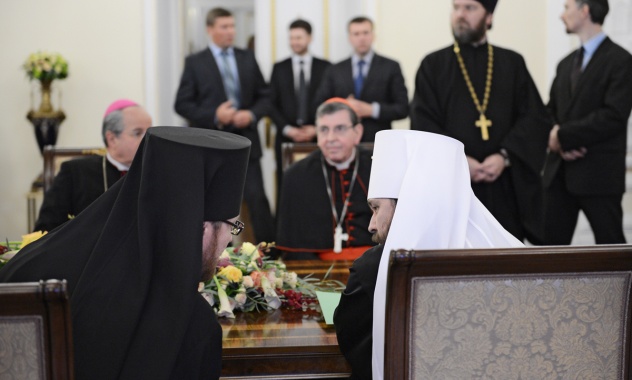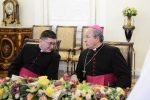Patriarch Kirill meets with president of Pontifical Council for Christian Unity Cardinal Kurt Koch
On December 18, 2013, a meeting took place between His Holiness Patriarch Kirill of Moscow and All Russia and the president of the Pontifical Council for Christian Unity, Cardinal Kurt Koch, at the patriarchal residence at St. Daniel’s Monastery.
Welcoming his guest, the primate of the Russian Orthodox Church said, “I value an opportunity for direct communication and dialogue. I believe this dialogue is very important, especially at this stage in the life of our two Churches”.
His Holiness also said that in the two years since his previous meeting with Cardinal Koch, many significant events took place in the life of the Russian Orthodox and the Roman Catholic Churches. “In this time, there has been a change of the Pontiff of Rome, and the election of Pope Francis raises great expectations because much of what the Pope has stated and proposed to the world and society coincides with our vision. We appreciate the fact that Pope Francis has expressed his sympathy with our Church on several occasions, also during meetings with Metropolitan Hilarion of Volokolamsk. These meetings show that the Pope of Rome and the Patriarch of Moscow have much in common in their attitude to the concerns felt by people in the world”, he said.
His Holiness made a special mention of the two Churches’ common attitude to the situation in the Middle East, particularly to the Syrian conflict. Patriarch Kirill told Cardinal Koch that he had been on a visit to Syria and Lebanon in the very beginning of the conflict and had an opportunity to meet with heads of Christian Churches in the Middle East and with political leaders of those countries. “My meeting with Catholic Patriarchs at the residence of the Maronite Patriarch in Lebanon was very important. I then felt the community of our stands on the problems of Syria, Lebanon and the whole Middle East”, he said.
“The most important thing I felt during those trips (and this was reconfirmed later) is that there is a threat of the disappearance of the Christian population, of the banishment of Christians from the places where they have existed for almost two thousand years. It will mean not only a grave violation of human rights and religious freedom but also the suffering of people and a change in the civilizational nature of the Middle East. In this region the first Christian, Islamic and Jewish communities emerged; therefore a violation of the balance of these communities threatens to change a certain cultural code of this land”, he said.
His Holiness pointed to the great importance of Pope Francis’ stand on this point, which he set forth in his message to the Russian President V. V. Putin on the occasion of the G20 meeting in St. Petersburg in September 2013. “I believe our shared stand on Syria is a very good platform for further dialogue between our two Churches about what is going on in the world today”, he said.
Another topic the importance of which is stressed by both the Orthodox and the Catholics is the preservation of traditional family values in today’s world. “We in Russia, Ukraine and other countries in the canonical territory of the Moscow Patriarchate seek to voice the position of our Church on this important issue and carry out intensive work to help preserve the family, to reduce the number of divorces, to oppose abortion, but, most importantly, to preserve the institute of the family as it is subjected today to a destructive impact from the secular consciousness. And we know that it is not a mere theoretical challenge to Christianity but certain practical actions to change legislation in a number of Western countries”, His Holiness said, expressing satisfaction with the fact that Pope Francis, too, defines the subject of the family as a priority.
The work on this problem is being carried out, including on the bilateral level, His Holiness noted. Thus, in November 2013, in Rome, the Department for External Church Relations and the Pontifical Council for the Family held a conference on the preservation of family values. The conference held in November in Warsaw on “The Future of Christianity in Europe. The Role of the Russian and Polish Churches and Peoples”, with the participation of representatives of the Russian Orthodox and the Roman Catholic Churches in Poland, paid a great attention to the problem of the family.
Today the world is facing a challenge of deepening social inequality and poverty. “In the 20th century, we as a people experienced many upheavals brought by revolutions, wars, the collapse of the state and economic systems in the end of the last century, which victimized a great number of our compatriots. A radical decline in the living conditions of the Russians, Ukrainians, Byelorussians and other peoples living in the former Soviet Union sharply posed the problem of poverty before our country and people throughout the territory in the pastoral care of the Russian Orthodox Church” His Holiness continued, “This problem is being solved, by God’s mercy. And we see the living conditions rising, especially in Russia, but in some places there are still hotbeds of poverty and this problem is always addressed in our message to society. The theme of social justice, economic disproportion, the need to develop charity and the social service of the Church stands in the center of our attention as well”. His Holiness stated that these problems are reflected in the position of the Catholic Church and its head as well.
“I believe it very important that we should exchange opinions on these issues within the bilateral dialogue, formal and informal, the more so that our two Churches are involved not only in the discussion on these topics but also in the solution of concrete problems”. His Holiness mentioned the broad social and charitable work of the Russian Orthodox Church and the aid she gives not only to victims of natural disasters, such as the flood in Krymsk, the flash flood in the Russian Far East and the tsunami in Japan, but also to people affected by economic crisis in a number of countries, for instance, in Greece.
His Holiness drew the attention of this guest to the situation in which the Syrian people have found themselves. “The situation is close to a humanitarian disaster”, he stated, “We are actively collecting material means; our parishioners are donating money. Both independently and in cooperation with other public organizations in Russia, we are sending humanitarian aid convoys and can see how much people need this aid”.
Patriarch Kirill also said that in the development of the Russian Orthodox Church in recent years there has been something similar to that which is going on today in the Catholic Church, especially in connection with the election of Pope Francis. The Pope stresses the importance and role of the Synod of Bishops. He has established a council of cardinals which is to help him find a solution of problems faced by the Church. In the Russian Orthodox Church, a Supreme Church Council under the Patriarch has been created consisting of heads of all the church departments. Besides, a few years ago, there appeared a completely new collegiate body of the Russian Church – the Inter-Council Presence. “It consists of bishops, priests and lay people. This body prepares important documents to be adopted by a Council of the Synod of our Church, but before that these documents go through general discussion as we send them out to all the dioceses, asking to give their responses; and we publish all this in the Internet. We receive thousands and thousands of amendments and remarks; then we try to incorporate them within reason into the documents. And after that, through a discussion in an Inter-Council Presence’s plenary session and in the Synod and in the Bishops’ Council, we receive as an output a document that has a great popular support”. As His Holiness noted, the Inter-Council Presence is an instrument of conciliarity helping the Russian Orthodox Church to adopt decisions supported by a majority. “Therefore we closely follow the development of the theme of conciliarity and primacy in the dialogue between the Catholic and the Orthodox Churches”, the Patriarch stated.
“We have a history of relations, an experience of cooperation, which allows looking to the future with optimism, in the hope that our two Churches will be able to make an influence on the awareness of the modern man so that the spiritual values may be strengthened in the life of society”, His Holiness concluded.
Cardinal Kurt Koch, on his part, conveyed to His Holiness Patriarch Kirill of Moscow and All Russia a greeting and best wishes to Pope Francis of Rome. He said that each Church has its own treasures. In his message, Pope Francis openly writes that we have learned much from the Orthodox, especially with regard to the episcopal collegiality and sobornost. He also referred to the rejection of Christian values by the modern world including the crisis of the institute of the family as a common challenge for all Christians.
According to Cardinal Koch, the Churches’ solidarity with regard to the situation in Syria and the Middle East as a whole is of great importance. He said he heard from Eastern Catholic patriarchs many words of gratitude to His Holiness Patriarch Kirill, who visited Syria and Lebanon at a hard time. He said that of great concern is the fact that Christianity is disappearing in the region. “If only stones remain there without people, we will lose the essence”, he stressed.
The parties also discussed the present state of Orthodox-Catholic theological dialogue held in the Joint International Commission and the difficulties it has encountered.
Cardinal Koch also shared with His Holiness his impressions of the visit he made to Ukraine in 2013 and his recent visit to St. Petersburg.
In conclusion of the meeting, which was held in an atmosphere of constructive dialogue and mutual understanding, the parties exchanged tokens.


















